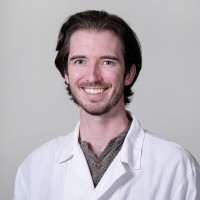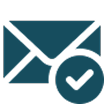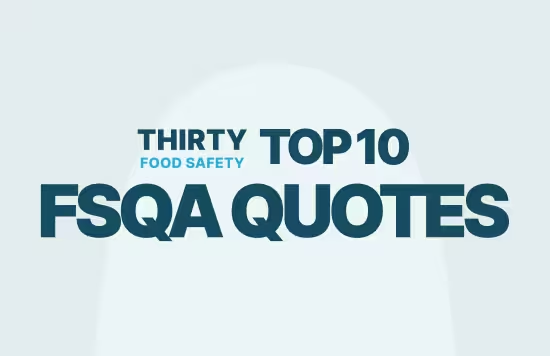

Top 7 PCQI Training Programs for FSMA & FDA: Costs & Format
.avif)
There's about a million different PCQI training options.
So how do you pick the right one?
This guide will cover the best PCQI training programs used by the top 10% of small to large food manufacturers.
Below are seven leading options for PCQI training. Each is recognized by the FDA as meeting the standardized curriculum developed by the Food Safety Preventive Controls Alliance (FSPCA).
Key Takeaways
- PCQI training is required for compliance with FDA FSMA Preventive Controls Rule.
- Training programs vary by cost, delivery format (online, in-person, hybrid), and duration.
- Choosing the right program depends on your facility size, compliance needs, and audit-readiness goals.
- A certified Preventive Controls Qualified Individual (PCQI) must develop and oversee the Food Safety Plan.
- Strong PCQI training reduces audit risks and strengthens FSQA programs.
What is PCQI Training?
The Preventive Controls Qualified Individual (PCQI) requirement comes from the FDA’s Food Safety Modernization Act (FSMA). Every facility covered by the Preventive Controls for Human Food rule must have a PCQI who is trained to:
- Develop and implement a Food Safety Plan.
- Conduct hazard analysis for biological, chemical, physical, and allergenic risks.
- Validate and verify preventive controls.
- Maintain records that stand up to FDA or third-party audits.
- Support FDA inspections and corrective actions.
PCQI training is essential because it equips employees with the skills to recognize hazards, build strong safety plans, and prepare for audits. Without this training, even well-designed systems can fall short during inspections.
Why Food Companies Should Provide PCQI Training to Employees
- Builds confidence in developing and managing Food Safety Plans.
- Reduces risk of costly recalls and foodborne illness outbreaks.
- Ensures staff can respond effectively to FDA inspections.
- Strengthens audit performance under SQF, BRCGS, and other GFSI standards.
- Creates consistency in recordkeeping and documentation.
- Improves overall food safety culture and accountability across the facility.
Why PCQI Training Matters
Legal Compliance
The FSMA Preventive Controls Rule (21 CFR Part 117) requires food facilities to assign a trained PCQI. This is not optional. A PCQI ensures your Food Safety Plan is legally valid and aligned with FDA expectations. Without one, you risk warning letters, fines, recalls, or even shutdowns.
Audit Performance
Third-party audits from certification standards like SQF or BRCGS almost always require proof of PCQI training. Auditors want to see documented evidence that your PCQI understands hazard analysis, preventive controls, and corrective actions. A certified PCQI strengthens your ability to demonstrate compliance with both FSMA and GFSI standards, boosting audit scores and reducing corrective action requests.
Risk Management
A well-trained PCQI goes beyond theory. They know how to conduct in-depth hazard analyses, validate process controls, and verify that procedures work in real-world conditions. This proactive approach reduces the chance of recalls, contamination events, or liability claims that could cost millions.
Operational Efficiency
Strong PCQI training includes documentation, recordkeeping, and system design. A trained PCQI knows how to build streamlined procedures, centralize digital records, and eliminate redundancies. This saves staff time, shortens audit prep from weeks to days, and creates a single source of truth for inspectors and internal teams.
Deep Dive: Comparing PCQI Training Options
1. FSPCA PCQI Training
FSPCA PCQI Training is the gold standard for most food and processing businesses. Developed by the Food Safety Preventive Controls Alliance in partnership with the FDA, this course is the most universally recognized. It includes:
- Standardized modules on hazard analysis and preventive controls, ensuring participants understand the full scope of FSMA requirements.
- Case studies that walk through contamination events, corrective actions, and food safety plan revisions.
- Instructor-led discussions that give context to FDA expectations and real-world applications.
- A certificate issued directly through FSPCA, widely accepted by auditors and regulators.
Best for: Facilities that want the most widely accepted training to avoid audit challenges and prepare staff with comprehensive, foundational knowledge.
2. AFDO (Association of Food & Drug Officials)
AFDO (Association of Food & Drug Officials) offers both in-person and hybrid PCQI training with a strong focus on regulatory compliance. Trainers often come from FDA or state regulatory backgrounds, offering insight into how inspectors approach coming FSMA 204 audits. Courses also emphasize state-level enforcement practices and how to prepare documentation that satisfies both federal and local regulators.
Best for: Compliance managers or facilities with a history of regulatory inspections who need deeper understanding of inspection protocols.
3. NSF International
NSF International has global credibility, especially for manufacturers who export products. Their PCQI training often includes additional modules on international standards like ISO 22000 and GFSI alignment. Participants also gain exposure to cross-border compliance scenarios and harmonization with global supply chain requirements.
Best for: Multi-site or international food companies that must balance U.S. FSMA requirements with global standards.
4. AIB International
Known for practical, industry-driven courses, AIB International emphasizes implementation on the production floor. Training incorporates facility walk-throughs, examples from bakery, snack, and packaged food industries, and strategies for training operators in hazard recognition.
Best for: Facilities that want training focused on operators and frontline supervisors, making PCQI requirements accessible and actionable at every level of production.
5. EAS Consulting Group
EAS Consulting Group provides PCQI training with an emphasis on regulatory updates and audit prep. Their trainers often serve as regulatory consultants, so sessions include mock inspection exercises, gap analysis techniques, and strategies for managing FDA Form 483 observations.
Best for: Companies that need both training and compliance consulting to strengthen audit readiness and regulatory response strategies.
6. Intertek Alchemy
Intertek Alchemy specializes in hybrid and private onsite training, allowing facilities to train multiple employees at once. Their courses are customizable to address specific product categories, allergen management, or facility hazards. Programs often integrate company-specific SOPs into training modules.
Best for: Facilities seeking flexibility and team-wide training, especially those managing diverse product lines or high-risk allergens.
7. Private Consulting Firms
Many consulting firms offer private PCQI training as part of broader FSQA support. These are the most expensive but also the most tailored to your operation. Training may include facility-specific hazard analysis, customized food safety plans, mock audits, and digital recordkeeping setup.
Best for: Large operations or high-risk facilities requiring tailored support, ongoing consultation, and integrated compliance management.
Key Considerations When Choosing PCQI Training
Format: Online vs. In-Person
- Online: Flexible, cost-efficient, and allows staff to train at their own pace. Ideal for companies with limited travel budgets or geographically dispersed teams.
- In-person: Provides interactive, hands-on learning and opportunities for networking. Best for teams that benefit from group exercises and live Q&A with instructors.
- Hybrid: Combines the convenience of online modules with the engagement of live sessions. Useful for organizations that want both flexibility and real-time instructor interaction.
Red flags: Providers offering only recorded webinars without instructor access, or courses that don’t issue a recognized certificate.
Cost and ROI
Cheaper training may save money upfront but could result in audit failures later. Consider the long-term return on investment by looking at both compliance and operational benefits:
- Audit outcomes: Higher-quality training improves audit scores, reduces corrective actions, and minimizes repeat findings.
- Recall prevention: Stronger hazard analysis reduces the risk of costly recalls, product withdrawals, and liability claims.
- Efficiency gains: Well-trained staff spend less time correcting mistakes, freeing them to focus on preventive tasks.
- Staff retention: Investing in advanced training helps retain skilled employees who feel supported in their roles.
- Customer trust: Demonstrating a commitment to robust training reassures retailers and buyers who often demand proof of compliance.
Red flags: Pricing that is far below industry average—this may indicate outdated materials, lack of FDA-recognized curriculum, or insufficient depth in hazard analysis and documentation practices.
Trainer Expertise
Select trainers with FDA or audit experience. A trainer with real inspection background offers insights that generic courses cannot, such as:
- Common mistakes FDA investigators see in Food Safety Plans.
- How auditors evaluate documentation and preventive control validation.
- Strategies for presenting records confidently during inspections.
Red flags: Trainers with no verifiable food industry or regulatory background, or providers unwilling to share trainer credentials.
Documentation and Audit Readiness
Look for training that emphasizes recordkeeping systems and audit prep. Documentation is often the deciding factor in audit outcomes. Strong programs will teach:
- How to set up digital recordkeeping systems.
- What FDA expects in hazard analysis and verification records.
- How to organize files so they are accessible and audit-ready at any time.
Red flags: Courses that do not cover documentation in depth, or training that focuses only on theory without showing how to apply it in audits.
How Digital Documentation Ensures PCQI Effectiveness
The FSQA landscape is shifting quickly, with new compliance requirements, digital traceability rules, and evolving GFSI audit expectations. Training a PCQI is only the first step—your team also needs digital tools that help them keep up with these demands. Allera provides that support with:
- Digital Food QMS that replaces paper binders and makes records instantly audit-ready.
- AI-driven document control to ensure versions are accurate and updates never get missed.
- Food Supplier management with a portal experience suppliers love, keeping supplier doucments up to date and compliant.
By integrating Allera into your FSQA program, you give your PCQI the ability to manage risks proactively, stay ahead of shifting compliance deadlines, and reduce audit stress. This combination of strong training and smarter tools ensures your food company is prepared for the future of digital compliance.
FAQs
Best PCQI certification online
The best PCQI certification online is the FSPCA Preventive Controls for Human Food course, since it is the FDA-recognized curriculum. Several training providers deliver this program virtually, including FSPCA, NSF, AFDO, and Intertek Alchemy. While costs range from $700–$1,200, the online format is ideal for food manufacturers who need flexibility while still meeting FSMA compliance requirements.
How do I get PCQI certified?
You get PCQI certified by completing an FDA-recognized training course, usually through the FSPCA Preventive Controls for Human Food program. The training takes about 2.5–3 days, can be done online or in-person, and covers preventive controls, hazard analysis, and recordkeeping. After finishing the course, you receive a PCQI certificate that auditors recognize as meeting FSMA requirements.
How long does PCQI certification last?
PCQI certification does not technically expire, but retraining is recommended every 3–5 years or when FSMA rules are updated. Auditors expect PCQIs to stay current with regulatory changes, industry practices, and company procedures. Many companies schedule refresher training to ensure employees remain qualified and up to date with FDA guidance.
.avif)





.avif)


.avif)


